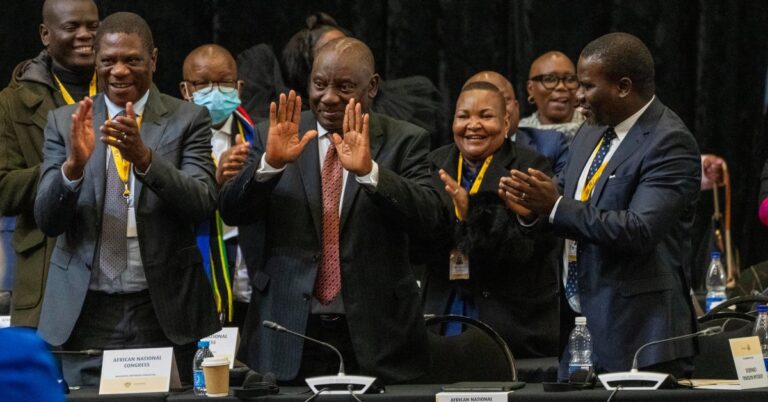CAPE TOWN, South Africa — South African President Cyril Ramaphosa was re-elected to a second term by lawmakers on Friday after his party struck a dramatic coalition deal with a former political rival just hours before the vote.
Ramaphosa, leader of the African National Congress, won a landslide victory in parliament against fellow nominee and surprise candidate Julius Malema of the far-left Economic Freedom Fighters, winning 283 votes to Malema’s 44 in the 400-seat lower house.
Ramaphosa, 71, secured a second term in office with the support of lawmakers from the country’s second-largest party, the Democratic Alliance, and several smaller parties who backed him in a vote that steered him to victory after the ANC lost its long-held majority and was reduced to 159 seats in landmark elections two weeks ago.
Eventually, during a lengthy break in parliament, the ANC signed a last-minute agreement with the DA, effectively ensuring that Ramaphosa would remain leader of Africa’s most industrialized economy. The two parties will now govern South Africa together in the first national coalition government in which no party has a majority in parliament.
The agreement, called the Government of National Unity, brings together the ANC with the white-led Democratic Alliance, which for years has been the main opposition and the ANC’s fiercest critic. At least two other smaller parties have also joined the agreement.
Ramaphose called the agreement, which has taken South Africa into uncharted territory, “a new birth, a new era for our country” and said it was time for the parties involved to “set aside our differences and work together”.
“This is what we need to do and this is what I am committed to accomplishing as president,” he said.
Nelson Mandela’s famous political party, the ANC, has ruled South Africa with an overwhelming majority since the end of the white-minority apartheid system in 1994.
But the party lost the majority it had held for three decades in national elections on May 29 in a watershed moment for South Africa, held against the backdrop of widespread dissatisfaction among South Africans with poverty, inequality and high unemployment.
But analysts warn that things could get complicated given the stark ideological differences between the former liberation movement ANC and the centrist, pro-business DA, which won 21% of the vote in the national elections, second only to the ANC’s 40%.
For one thing, the DA opposed the ANC government’s move to accuse Israel of committing genocide in Gaza in a highly sensitive case at the UN’s highest court.
DA Leader John Steenhausen was the first to confirm the agreement.
“From today, the DA will collectively govern South Africa in a spirit of unity and cooperation,” he said as he walked out of parliament on Friday in a live-televised address after the agreement was signed and DA lawmakers said they would vote for Ramaphosa in the presidential election.
Parliament began at 10 a.m. in an unusual location, a conference centre near Cape Town’s waterfront, after a fire gutted the city’s historic Parliament Building in 2022. Parliament began with hours of swearing in of hundreds of new members and the election of a speaker and deputy speaker.
Voting for the presidential election began at midnight and the results were not announced until just after 10pm. President Ramaphosa finished his acceptance speech as the clock struck midnight and into Saturday.
Former president Jacob Zuma’s MK party boycotted parliament but this did not affect the vote as only a third of parliament is needed for a quorum.
ANC secretary-general Fikile Mbalula said the party was open to discussions with anyone else who wanted to join a unity government. Eighteen parties are represented in parliament and Mbalula said a multi-party agreement “puts the country first across political and ideological divides”.
Several political parties, including Malema’s EFF, refused to take part.
The other two parties in the coalition agreement were the Inkatha Freedom Party and the Patriotic Alliance, the latter of which has attracted attention because its leader, Gayton McKenzie, had served time in prison for bank robbery.
McKenzie said he had been given a second chance at life and South Africa now had the chance to solve its serious socio-economic problems.
The ANC faced a deadline to reach a coalition agreement because parliament had to choose a president within 14 days of the announcement of election results on June 2. The ANC had been trying to reach a coalition agreement for two weeks, with final negotiations taking place overnight on Thursday and Friday, party officials said.
The last time South Africa faced such political uncertainty was in 1994, when the ANC came to power in the first all-race elections, ending nearly half a century of racial discrimination. Since then, all of South Africa’s leaders, starting with Mandela, have been from the ANC.
The new unity government also harkens back to the way South Africa’s first black president, Mandela, invited political opponents into a unity government as part of a reconciliation effort when the ANC held a majority in 1994. As a young politician, Ramaphosa played a key role in those negotiations.
This time the ANC was forced to act.
“The ANC has been very generous in admitting defeat and saying, ‘let’s have a conversation,'” said McKenzie, the PA leader.

